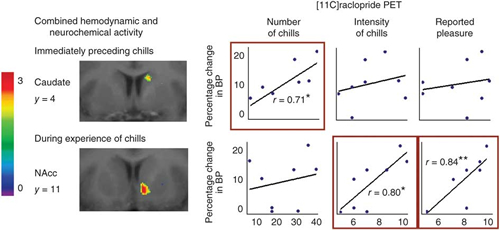An "outburst of the soul," the composer Frederick Delius called music. The sounds associated with the form produce "a kind of pleasure which human nature cannot do without," observed Confucius. It is the art "which is most nigh to tears and memory," noted the writer Oscar Wilde.
It turns out that these guys were more on target than we thought. Our experience of the music we love stimulates the pleasure chemical dopamine in our brain, concludes a new study produced by a slew of scholars at McGill University. The researchers followed the brain patterns of test subjects with MRI imaging, and identified dopamine streaming into the striatum region of their forebrains "at peak emotional arousal during music listening."
Not only that, but the scientists noticed that various parts of the striatum responded to the dopamine rush differently. The caudate was more involved during the expectation of some really nice musical excerpt, and the nucleus accumbens took the lead during "the experience of peak emotional responses to music."
In other words, just the anticipation our favorite passage stimulates the production of dopamine. "Our results help to explain why music is of such high value across all human societies," the writers conclude.
Chills and thrills
To learn more about the music/brain/stimulation process, the McGill researchers followed subjects through the 'chills' or 'musical frisson' response moment. You may have thought that chills were just a subjective concept, but that isn't the case. They involve a "clear and discrete pattern of autonomic nervous system (ANS) arousal," the experimenters say, which facilitate "objective verification through psychophysiological measurements."
Bottom line: the chills moment "can be used to objectively index pleasure." So these scientists rounded up a cohort of people who had a proven record of getting the "verifiable chills" when listening to their favorite songs.



 Loading comments...
Loading comments...
